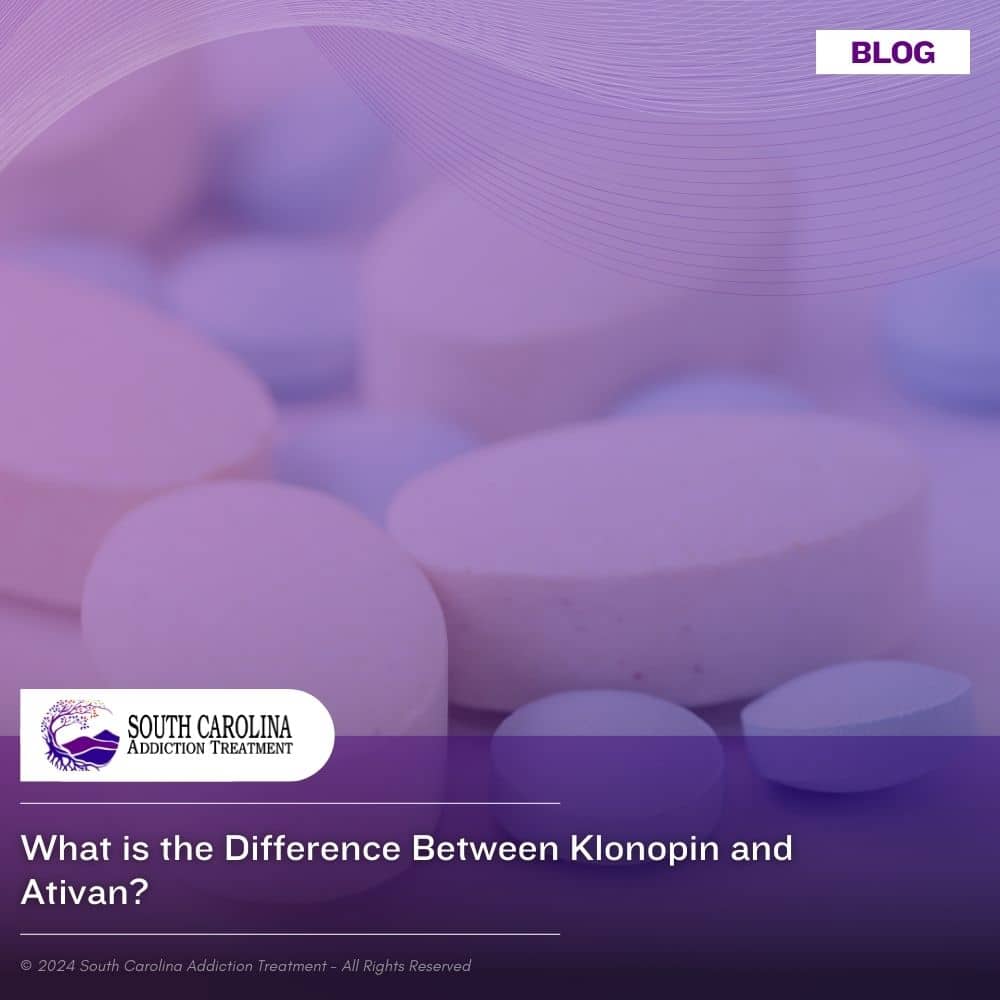What is the Difference Between Klonopin and Ativan?

Medically Verified: 2/1/24
Medical Reviewer
Chief Editor

All of the information on this page has been reviewed and verified by a certified addiction professional.
Benzodiazepines are a class of drugs that depress the central nervous system. They are available by prescription to treat a wide range of conditions, including anxiety and seizure disorders, and even alcohol withdrawal. They are effective anti-anxiety medications because they slow down activity in your brain.
While benzodiazepines have medical uses, they also have a high potential for abuse and addiction. According to the National Institute on Drug Abuse (NIDA), 5.2 million Americans abused benzodiazepines in 2018.
Two of the most commonly used benzodiazepines include Klonopin and Ativan. While these medications have many similarities, they also have distinct differences to be aware of. For example, Ativan has a higher potential for abuse because it has a shorter half-life.
What is Klonopin (Clonazepam)?
Klonopin is the brand name for a drug known as clonazepam. It is a central nervous system (CNS) depressant that belongs to the class of drugs known as benzodiazepines.
Klonopin is commonly used to treat anxiety disorders and panic attacks. It might also be used to manage seizure disorders like status epilepticus.
The common side effects of Klonopin include:
- Dizziness and drowsiness
- Unsteadiness and coordination issues
- Trouble concentrating or memory issues
- Increased salivation
- Muscle or joint pain
- Frequent urination
- Blurry vision
- Changes in sex drive or ability
Klonopin offers short-term relief for anxiety. It is not intended to be used long-term, as it can be habit-forming and addictive. Many people abuse Klonopin to experience a drowsy and euphoric high.
Long-term abuse of clonazepam can significantly impact your life, leading to health issues, worsening symptoms of mental illness, and life-threatening overdoses. Because of this, you should always seek treatment for addiction if you are misusing Klonopin.
What is Ativan (Lorazepam)?
Like Klonopin, Ativan (lorazepam) is a prescription benzodiazepine used to treat a wide range of conditions. Ativan is FDA-approved to treat panic disorders, seizure conditions, and symptoms of anxiety or anxiety associated with depressive symptoms.
Ativan affects gamma-aminobutyric acid in the brain, allowing it to relieve anxiety and prevent seizures from occurring. The drug might be used off-label to treat insomnia or as a pre-anesthesia medication before operations.
The common side effects of Ativan include:
- Dizziness and drowsiness
- Lightheadedness
- Impaired coordination
- Concentration and memory issues
- Fatigue
- Nausea
- Appetite changes
- Restlessness or excitement
- Blurry vision
- Changes in sex drive or ability
Like many other benzodiazepines, Ativan is only intended for short-term use. Using this medication long-term could result in physical dependence. If you become addicted to Ativan, you should consider attending a drug rehab program.
Klonopin vs Ativan: Understanding the Differences
While Ativan and Klonopin have many similarities, there are some differences you should be aware of. Knowing how these medications are different could help you understand which one is right for you. Additionally, being aware of the details about these benzodiazepines might prevent you from misusing them.
The main differences between Klonopin (clonazepam) and Ativan (lorazepam) include:
Medical Uses
There are some differences between Klonopin and Ativan regarding their medical uses. First, Klonopin is FDA-approved to treat panic disorder and certain seizure conditions. On the other hand, Ativan is FDA-approved to treat anxiety disorder, anxiety associated with depressive symptoms, and active seizures.
Off-label uses for Klonopin include:
- Restless leg syndrome
- Tardive dyskinesia
- REM sleep behavior disorder
The off-label uses for Ativan include:
- Alcohol withdrawal syndrome
- Muscle spasms
- Headaches
- Panic disorder
Forms
Both Klonopin and Ativan come in tablet form. However, Klonopin is available as disintegrating wafers and Ativan sometimes comes in a liquid. Typically, these forms are used when a person is unable to swallow a tablet or pill.
Strength
While Klonopin and Ativan are both available in doses of 0.5 mg, 1 mg, and 2 mg, there are some differences in their strengths. Klonopin is considered to be slightly more potent than Ativan. For example, the starting dose for treating panic disorder is 0.25 mg twice per day, while Ativan is 2 to 3 mg per day.
Drug Interactions
There are more drug interactions associated with Klonopin than Ativan.
The main drug interactions with Klonopin include:
- Opioids
- Other benzodiazepines
- Barbiturates
- Antipsychotics
- Valproic acid
- Phenytoin
- Carbamazepine
- Lamotrigine
- Fluconazole
Ativan may negatively interact with:
- Opioids
- Other benzodiazepines
- Barbiturates
- Antipsychotics
- Valproic acid
- Oral contraceptives
Addiction Potential
All benzodiazepines carry a risk of addiction, especially when taken long-term or in higher doses than prescribed. That being said, some benzodiazepines have a higher addiction potential than others.
Ativan is considered to have a higher potential for addiction than Klonopin. This is because Ativan is an intermediate-acting benzodiazepine, while Klonopin is long-acting.
When the half-life is shorter, people will experience withdrawal symptoms faster. This causes them to abuse more of the drug than they should.
You can become addicted to both Klonopin and Ativan. You should only take the medication as prescribed and seek help if you believe you are developing an addiction.
Find Help for Ativan or Klonopin Abuse
If you or a loved one suffers from Ativan or Klonopin abuse, it’s time to seek help. Benzodiazepine addiction can significantly impact your life, increasing your risk of life-threatening overdoses and long-term health consequences.
At South Carolina Addiction Treatment Center, we can offer the tools and support you need to recover. Contact us today for more information on our prescription drug rehab center.

